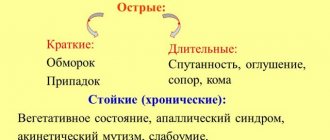Multi-channel free hotline Legal advice on criminal law. Every day from 9.00 to 21.00
Moscow and region: +7 (495) 662-44-36
St. Petersburg: +7 (812) 449-43-40
Concept and signs
The state of affect in criminal law does not differ in understanding from the version of psychologists. It represents a strong emotional disturbance that always arises suddenly. It is provoked by specific actions that are committed by the victim and are immoral in nature.
The duration of such behavior also influences the definition of such a disorder. It can be either a one-time act or systematic actions. The circumstance that caused the condition in question cannot cover the person’s intent to commit a crime; it gives rise to a sudden desire that is uncontrollable by the perpetrator.
To establish the disorder, psychological and physiological research methods are used. They must be applied together to fully reflect the individual's condition.
In the criminal legal sphere, the anomaly in question is a significant factor also because it is considered as limited sanity, and its presence is a prerequisite for the application of liability measures. Accordingly, such a disorder is of a mitigating nature, since a person is unable to independently control what is happening, which makes intent less obvious.
To correctly establish the psychological deviation in question, signs of affect are determined in criminal law. The criminological nature of such provisions is important, since psychology considers this phenomenon in the most general and accurate understanding.
The uniqueness of the phenomenon under consideration can also reveal its features.
Its presence can be proven by the following provisions:
- the occurrence of a deviation always involves suddenness, such a state breaks a person’s will, not allowing him to control the actions performed;
- the disorder passes briefly, no more than a few minutes, but an exact figure cannot be established;
- emotional limit, the peak of a person’s condition is always expected to be reached;
- the body’s reaction, often a person may develop red spots on the body, arrhythmia, voice changes, and so on;
- increased activity, since in the state under consideration a person’s actions are always chaotic and unconscious;
- lack of control, which implies that the person does not manage himself and does not understand what is happening;
- disproportionality of actions to those committed by the victim;
- grave consequences of the actions taken.
Taking into account these points, the affect itself and its criminal legal significance are determined, which contributes to the correct classification of crimes.
The main legal cause of mental abnormality is the behavior of the victim, which is negative. It can become an impetus immediately, after some news has been conveyed to the culprit or an immoral offense has been committed against him, or it can create a cumulative effect.
The result of the disorder is always complete or partial loss of memory, since the brain automatically blocks access to negative emotions and their consequences.
Example: a woman has suffered humiliation and beatings from her husband for a long time. At a certain point, the negative emotion develops into a disorder, which leads to sudden emotional disturbance, and she kills her husband by stabbing him several times. There is everything here: the influence of the negative behavior of the murdered person, the disproportion of beatings and murder, increased activity, lack of awareness of what is happening. As a result, she simply does not remember what happened.
Types of affect
Stress is one of the important influential factors on the emotional state of every person. Taking into account the specific situation and further developments of events, three types of Affectus :
- Physiological affect is a completely normal reaction of the body to a stressful situation. A manifestation of this type is noted as a result of severe emotional shock. Demonstration of the condition is considered moderate and does not go beyond the permitted social boundaries. The affect arises very quickly and subsides just as quickly. Some people don't even notice much change in their behavior.
- A pathological effect is a painful condition that can occur to an absolutely healthy person as a result of the psychotraumatic conditions in which he finds himself. The activity of manifestations is individual and directly depends on the personality of each person. Those who have disturbances in the functioning of the nervous system, inhibition and impaired excitation processes are prone to such affect. The form of expression is verbal and physical aggression directed at others.
- Affect of inadequacy - compared to the two previous types, this affect has a long-term, constant effect. It occurs due to the fact that the individual does not have the ability to perform the desired action. For young children this is a completely normal reaction. However, for adults, such affect has a detrimental effect - manifestations of aggression, resentment, and negativism.
Taking into account the specific type of affective state, one can judge the nature of the crime. This happens by analyzing patient responses to detailed questions about the internal sensations of what happened.
Strong emotional disturbance during an “excess of defense” acts as an accompanying subjective circumstance and should not affect the qualification of the defender’s actions.
Kinds
The characteristics of the mental state in question make it possible to determine it in the event of unlawful actions. However, they are largely influenced by the types of affect defined in criminal law. Regardless of the type of disorder, a person always partially retains the ability to be aware of what is happening, that is, he does not fall into a state of complete insanity.
For criminal law, the very fact of establishing a deviation is important; it must determine the indicator of sanity that would mitigate or cancel responsibility for the crime.
Any mental anomaly is always associated with the human psyche. Physical impairments are not characteristic of the disorder. For example, if a person is mute, then this cannot serve as a determining factor. The impact is on emotions. Their manifestation determines what affective state will be established.
In criminal law, several types of affect are taken into account. The characteristics of each of them determine the nature of the disorder when it is qualified.
These types include the following:
- Pathological affect. This type completely eliminates the state of sanity. That is, anxiety in this case completely paralyzes the will, not allowing the person to realize what is happening, due to which pathology is formed. In this case, criminal liability is excluded.
- Physiological disorder. There is limited sanity at work here. Although the ability to realize what is happening remains, it is significantly reduced. Responsibility applies here in accordance with the norms of the law, reflecting crimes committed in an affective state.
- Abnormal affect and criminal liability. It is also used for non-psychopathic disorders. That is, the influence is exerted not only by emotional stress, but also by anomalies that affect the course of the disorder, for example, drug or alcohol intoxication.
- Cumulative affect in criminal law. Here the peculiarity is manifested in the fact that such behavior is caused not by a momentary, but by a long-term negative event. It provokes an unbalanced state and leads to crime.
- Interrupted nervous state. It can have a relationship with any of the previous types; its specificity is that it is interrupted, moreover, due to external influence, and not due to independent stabilization of the psyche.
Such a deviation leads to negative consequences, disrupting the psyche and reducing a person’s activity even after the excitement has arisen.
This variant of the disorder is considered to be negative. The opposite is the positive version of the disorder; on the contrary, it does not reduce activity, but simplifies thinking and leads to the development of stereotypes.
What is affect
Affect
in psychology they call an emotional process that has a sharp, explosive nature. This process does not last long and is characterized by high intensity, which is accompanied by obvious motor manifestations, changes in the psyche and the functioning of internal organs. The state of affect is unconscious and expresses an instinctive subjective assessment of the current situation.
Affects are also inherent in animals. For them, they are a reaction to factors related to the maintenance of their physical existence and associated with instincts and biological needs. In humans, many biological processes, including this one, have undergone significant modification under the influence of social development; As a result, a person’s state of affect can also arise for reasons not related to biological life. The biological principle in modern man is strictly subordinated to the social. Thus, public assessments and sanctions are one of the most common reasons for the emergence of a state of passion.
Affects in psychology are usually strictly distinguished from other emotional reactions.
:
- Affects differ from feelings, moods and emotions in that they have a short period of existence and high intensity, and also in that they always arise in response to a situation that has already occurred;
- Affects differ from experiences in that they affect not only the mental side of the personality, but also physiological changes.
In a state of passion, a person’s behavior becomes uncontrollable. A so-called affective action arises. It does not have any external goal and is carried out under the pressure of suddenly surging feelings. The meaning of affective action is “internal”: to relieve tension, take revenge, satisfy passion.
The onset of affect is associated with changes in autonomic reactions: pulse and breathing quicken, spasm of peripheral blood vessels occurs, sweat appears, etc. In addition, disturbances appear in the voluntary motor sphere: inhibition, excessive excitation, impaired coordination of movements. All these phenomena at one time prompted scientists to create a “lie detector.” This device registers many changing parameters in the body, on the basis of which a specialist can draw a conclusion about a certain mental state of the subject. The polygraph, as it is commonly called a “lie detector,” is actively used today in forensic science, but the appropriateness of its use is questioned: changes in physiological processes cannot clearly indicate that a person is lying. Scientific studies have shown that the accuracy of the “lie detector” leaves much to be desired; and if law enforcement agencies place excessive faith in the testimony of this apparatus, then there is a high probability that an innocent person will be convicted of a crime.
If the affect is strong enough, then it disrupts the normal functioning of higher mental functions: a person experiences a narrowing or clouding of consciousness, perception and thinking are distorted.
Crimes of passion
Actions of a criminal nature that are accompanied by a mental disorder not related to insanity are widely covered by criminal law. Today, the Criminal Code of the Russian Federation contains several articles establishing penalties for such acts. As a separate phenomenon, such a feature is not reflected in the legislation in any way.
In the law, the topic of affect is addressed by separate articles of the code that define acts that may be associated with such a disorder.
These include the following:
- Art. 107 of the Criminal Code of the Russian Federation. It reflects the composition of the act, which implies the commission of murder in the presence of the deviation in question.
- Art. 113 of the Criminal Code of the Russian Federation. It establishes a composition that is associated with harm to health, both severe and moderate, but also in the presence of a sudden disorder.
The work of psychiatrists concerns only those subjects in whom the disorder leads to serious consequences. Minor harm, beatings or other similar actions cannot be associated with passion.
Regardless of the nature of the act, it is necessary to determine the objective and subjective characteristics that form the corpus delicti of any crime.
In the criminal sphere, it is important to establish other circumstances that determine an action as illegal. Emotional anxiety is only one of several. However, it is important to understand whether the murder was caused by direct intent or whether the act was of a different nature.
For any act, it is important to determine the object, what is being harmed. The objective side is the manifestation of encroachment. This forms a set of objective conditions. Subjective ones include the characteristics of the person himself - the culprit, and the subjective side. It involves the presence of guilt - a person’s attitude towards what he does. Affect is a component of guilt.
Guilt is expressed only in the form of intent or negligence. Affect is accompanied by intent, but not planned, but caused by certain circumstances. In addition, the deviation itself is an optional feature that accompanies guilt and transforms into a mandatory one if it is necessary to determine the acts under the above articles.
In criminal law, to determine the nature of the act committed in the state in question, it is necessary to establish the following conditions essential to the case:
- intent, as the subjective side of an act;
- sudden excitement;
- uncontrolled actions leading to serious consequences;
- unacceptable, negative behavior on the part of the injured party, regardless of whether it was momentary or lasted for some time.
The last two provisions relate specifically to the objective side of the matter; without them, it will not be possible to determine such a state of a person.
The control point in determining the disorder is the planning of all actions, as well as the behavior of the perpetrator after the act has been completed. This affects the objective side of the issue. For example, if the fact of preparation for a crime is established or after the crime the person tried to hide traces, then the act cannot automatically be considered committed in the heat of passion. Suddenness refers not only to the manifestation of disorder, but also to the implementation of criminal actions.
The importance of the emotional state when qualifying murders and other crimes in the Criminal Code
Expert opinion
obrashhenie-v-sud
Exceeding the limits of necessary defense, committed in a state of passion, excludes criminal liability, regardless of the consequences. Since the same reason can cause different uncontrollable emotions in different people (for one - fear, and for another - anger).
According to Art. 116 of the Criminal Code of Ukraine for murder in a state of passion, the offender must bear criminal liability. This applies to citizens who are in a state of physiological affect:
- a person’s self-esteem and self-control become difficult;
- a decrease in control over one’s actions, but not a complete loss of control.
In a state of pathological affect, a person does not understand what he is doing and cannot control himself. Therefore, according to Art. 19 of the Criminal Code, the criminal was declared insane at this moment.
Art. 116 of the Criminal Code provides for criminal liability for criminals who committed premeditated murder while in a state of physiological affect. All other cases: infliction of bodily harm of varying degrees of severity or murder by negligence - are qualified under Art. 119 of the Criminal Code.
Murder is not considered under Art. 116 of the Criminal Code in several cases when physiological affect was caused by the legitimate actions of the victim:
- taking into custody (Article 155 of the Code of Criminal Procedure);
- confiscation of movable and immovable property (Article 59 of the Criminal Code);
- detention of a criminal (Article 38 of the Criminal Code) and more.
As a result, a crime committed in the process of physiological affect is considered as a reaction to the unlawful actions of the victim. Therefore, such a crime is considered committed under mitigating circumstances.
Phases of affect
In psychology, there are 3 stages of affect:
- Preparation. It can last quite a long time or be short. Represents an emotional reaction to contact with a stimulus. A person can still control his emotions. But if for some reason he fails, the second phase begins.
- Explosion. Here the individual is unable to control himself. Moreover, most often he is not even aware of himself or his actions. Therefore, he can do anything, including murder.
- Conclusion. The emotional explosion gives way to devastation and exhaustion. What happened is not remembered. False memories are also possible.
Affect occurs even in those people who do not display aggression or other negative emotions in everyday life. But when exposed to certain factors, for example, a threat to their life or the lives of others, they are capable of very unusual actions.
Treating affect in people with mental disorders
If, in a state of passion, a person has committed illegal actions or caused harm to someone, he is given a referral to a psychiatrist. Further actions depend on the diagnosis:
- In case of depression and suicidal tendencies, the patient is subject to increased monitoring. It is advisable that he be in a hospital.
- If psychosis is diagnosed, antidepressants and antipsychotics are prescribed. If the patient for some reason cannot take medications, they are replaced with electroconvulsive therapy.
- For mania and euphoria, taking antipsychotics is also indicated. Treatment should be carried out in a hospital under the supervision of doctors.
- Mild psychogenic depression can be treated at home by taking sedatives and antidepressants.
You should not self-medicate affect. Only a doctor can prescribe medications and draw up a regimen for their use. Otherwise, the patient's condition will only worsen.
Causes of affect
The most important cause of affect is circumstances that threaten a person’s existence (indirect or direct threat to life). The reason may also be a conflict, a contradiction between a strong desire, attraction, desire for something and the inability to objectively satisfy the impulse. It is impossible for the person himself to comprehend this situation. Conflict can also be expressed in increased demands that are placed on a person at that particular moment.
An affective reaction can be provoked by the actions of others that affect a person’s self-esteem and thereby traumatize his personality. The presence of a conflict situation is mandatory, but not sufficient for the emergence of an affective situation. Of great importance are the stable individual psychological characteristics of the individual, as well as the temporary state of the subject who finds himself in a conflict situation. For one person, circumstances will cause a violation of a harmonious system of behavior, but for another not.
Questions to ask the experts
Thus, when a lawyer defending a criminal defendant decides to go to the CSPE, it is necessary to clearly articulate the questions that should be asked by the experts.
Before the adoption of the new Criminal Code, experts were asked whether the accused was in a physiological state at the time of the commission of the crime. A positive answer to such a question will have a significant impact on the qualification of the acts committed by the accused under the relevant articles of the Criminal Code (Articles 107, 113).
Against this background, the conclusions made in the decision of the Supreme Court of the Russian Federation dated September 9, 1998 in the Klimova case, about the commission of a crime under paragraph “d” of Art. 102 of the Criminal Code of the RSFSR (murder committed with extreme cruelty).
The motives established by the court, the circumstances of the crime, and Klimova’s mental state immediately at the time of the crime lead to the conclusion that she committed the murder of G. in a state of sudden strong mental arousal caused by violence, bullying of the victim, as well as a long-term psychotraumatic situation that arose as a result systematic illegal and immoral behavior of the victim, i.e. committed a crime under Part 1 of Art. 107 of the Criminal Code of the Russian Federation.
The expert’s reference to the fact that Klimova’s state of mind did not have a “physiological effect” cannot, in this particular case, affect the objective legal assessment of the convict’s state of mind at the time of the crime, taking into account the nature of the victim’s behavior and the suddenness of the murderous intent. The suddenness of the actions of Klimova, who in a short time inflicted wounds on the victim immediately after she was subjected to violence on his part, is also confirmed by the randomness of her choice of instruments of crime (kitchen knives, forks), and the randomness of the blows inflicted.
However, the question of whether the accused is in a state of passion should not and cannot be the only one. In addition, when asking questions to an expert, the adviser must formulate them in such a way that the expert cannot answer the question negatively.
It is necessary to pay attention to the point of view of I.A. Kudryavtseva: “When identifying the psychological cause-and-effect relationships of affect, specialists can only take into account the subjective meaning of the affective cause. In no case should it be confused with the legal concepts of the gravity of the offense, immorality of actions and other qualifying features of Art. 107 of the Criminal Code of the Russian Federation and replace legal concepts with psychological ones. Assessing the objective gravity and legal qualification of the victim’s unlawful actions that caused the assault is the prerogative and competence of only lawyers.”
In this light, the defense attorney could be advised to formulate questions that are more related to the field of psychological science and take the form “is it possible in the heat of the moment that ...”, “is it characteristic of a state of passion that ...”, “is the defendant’s behavior in the heat of the moment when..." After such introductory phrases, the lawyer must point out the circumstances that arose in the specific case in which he is working. Examples include questions such as:
Is it possible to have a state of affect in people who are anxious, indecisive and have repeatedly attempted suicide?
Is the defendant's behavior before and during the act of passion typical, such as muttering, panting, "strange" facial expressions, and shaking hands?
Does this happen in the heat of the moment when the defendant remains near the body after the murder and falls asleep?
Is partial memory loss possible in a state of passion?
Is it typical for a state of passion that the accused says: “I don’t know what came over me”, “I don’t understand why I did it”?
Only after these questions is it reasonable to ask the main question: Was the accused in a state of anger?
This order and way of asking questions should push the expert to answer positively the last question: about the state of affect.










